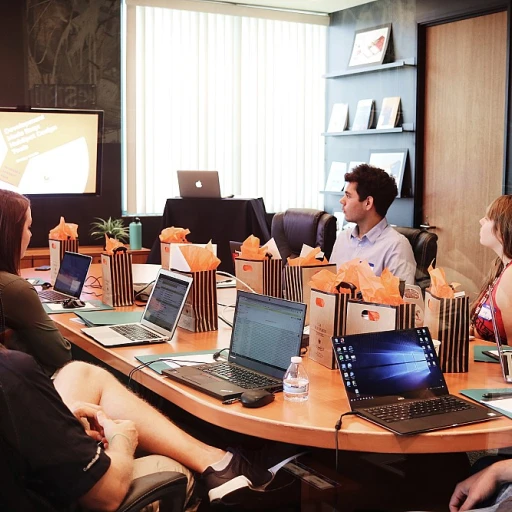
The Growing Importance of Misdemeanor Background Checks
Increasing Relevance of Misdemeanor Checks
In today's job market, the use of misdemeanor background checks has become increasingly crucial for employers. With a rise in focus on an individual's complete criminal history, private employers are turning to these checks to gain a deeper understanding of potential hires. This trend is driven by the need to ensure a safe and trustworthy work environment, aligning with the overarching goals of criminal justice initiatives.
The importance of these checks cannot be understated, as they provide insight into a person's past misdemeanor convictions, which are often considered less severe than felonies. However, even a single misdemeanor could influence job opportunities, given the competitive nature of the current employment market. Understanding how certain checks influence hiring decisions is critical for applicants and hiring managers alike.
Public records of misdemeanor convictions play a significant role in shaping a candidate's eligibility for employment. Employers utilize this data to assess the potential risk posed by hiring candidates with prior misdemeanor records. While some organizations have adopted the 'ban the box' approach, which delays background checks until later in the hiring process, others still rely heavily on initial screenings involving misdemeanor records.
It's also worth noting that the weight of these misdemeanor checks can vary based on the state and specific laws governing employment licensing and background checks. Thus, awareness of local legislation is vital for both employers and job seekers. An understanding of one's rights and the legalities surrounding misdemeanor checks can help mitigate misunderstandings and improve transparency during the hiring process.
Moreover, advancements in technology have refined the background check process, allowing for more detailed and efficient screenings. These technological improvements are impacting how easily misdemeanor conviction records are accessed and utilized by employers, as discussed further in related topics. Recognizing these trends and their implications is essential for adapting to the evolving landscape of background checks.
How Misdemeanor Records Affect Employment Opportunities
Influence of Misdemeanor Records on Job Prospects
The impact of misdemeanor records on employment opportunities cannot be underestimated. Many employers conduct exhaustive criminal background checks to ensure they are hiring the right candidates. Although policies can vary significantly from state to state, it’s a common trend for private and public employers alike to delve into an applicant’s criminal history during the hiring process. While some employers may overlook minor infractions, others consider every detail in conviction records, especially recent ones. This scrutiny becomes especially relevant when a job applicant's criminal background includes misdemeanors, which encompass a range of offenses considered less severe than felonies but still significant. The existence of a misdemeanor conviction on a criminal history record can hinder job opportunities, as certain positions demand a spotless legal history. Specifically, roles involving security, finance, or positions related to employment licensing often require thorough checks. Depending on the law in each state, some records might be more accessible to prospective employers, emphasizing the need for individuals with such backgrounds to be aware of their rights. Moreover, the timing of when a criminal background check is performed can play an essential role. Some progressive companies adhere to the 'ban-the-box' initiative, which delays questions about criminal convictions until later in the hiring process, typically after an initial application or interview. This offers individuals with misdemeanor convictions a better chance to demonstrate their qualifications without early prejudice based on their history record. Understanding how courts view and evaluate misdemeanor convictions can further elucidate how these records affect employment. For a deeper understanding, examining how courts evaluate trial decisions offers valuable insights into your rights and potential repercussions of your criminal background. In conclusion, knowing how misdemeanor records affect employment opportunities is essential for individuals seeking to navigate the complexities of job markets. Awareness of both legal rights and emerging employment trends will arm job seekers with the knowledge needed to proactively address their criminal records.Legal Considerations and Rights in Misdemeanor Background Checks
Navigating the Legal Landscape
Individuals and employers must be well-informed about the laws surrounding misdemeanor background checks. While these checks are becoming increasingly common as part of the hiring process, each state has its own regulations about what kind of criminal history records are accessible and how they can be used by employers.
One crucial aspect is understanding the distinction between different types of conviction records and the public accessibility of these records. Some states have "ban the box" laws that prohibit employers from asking about a criminal background right away on a job application. These laws often require employers to make a conditional offer before examining one's criminal history record. Additionally, misdemeanor conviction records may not always be available through public databases, depending on state laws.
Employment licensing can also be affected by misdemeanor convictions, particularly in sectors sensitive to legal transgressions. While private employers generally have more leeway in deciding whether to consider misdemeanor convictions during employment checks, they must still adhere to federal employment discrimination laws.
One growing trend is the use of technological advances to streamline the background check process. These innovations make it easier for businesses to conduct thorough checks, including reviewing criminal records and hiring history in a matter of days or even hours. This technological evolution seeks to balance employers' need for thorough screening with candidates' rights under the criminal justice system.
For a deeper understanding of this topic, you might also want to explore how fines such as speeding tickets could unexpectedly impact employment opportunities in related areas.
Technological Advances in Background Check Processes
Innovations Shaping Background Check Technologies
In recent years, technological advances have significantly transformed the processes involved in criminal background checks, including those for misdemeanors. Automation and artificial intelligence are streamlining the assessment and analysis of criminal records, significantly reducing the time required for employers to conduct background checks on potential hires.
Previously, retrieving a criminal history or misdemeanor record from various state databases could be a lengthy, complicated task. With advancements in technology, employers now have access to integrated systems that aggregate public records more efficiently. This ensures that misdemeanor background checks, as well as the examination of criminal convictions, are completed with greater accuracy and speed.
Another technological leap is the use of improved algorithms and machine learning tools to refine the background check process. These advancements help reduce errors that might arise from human oversight and allow for a more precise evaluation of an individual's criminal history, including misdemeanor convictions.
Enhanced Security Protocols
With the surge in digitalization, there is a growing emphasis on cybersecurity within the criminal justice and background check industries. Private employers are increasingly investing in secure platforms that ensure the safekeeping of sensitive information. This trend is pivotal as the availability of personal records grows. The need to protect data from breaches is paramount, given that background checks and criminal records contain personal and potentially sensitive information.
Employers are adopting encryption technologies and implementing secure verification methods to authenticate identity while handling criminal records. These practices help prevent unauthorized access and ensure compliance with laws regulating the handling of background check information.
Evolving Legal Frameworks
State and federal laws governing background checks are continuously evolving to keep pace with technological advancements. Legal regulations regarding the duration and scope of accessing criminal records for employment purposes are being revised to address concerns over privacy and discrimination. For example, the "ban the box" movement, which seeks to remove questions about conviction records from job applications, is influencing how employers manage the hiring process.
Furthermore, conditional offers of employment are often required before conducting more extensive background or misdemeanor checks, aligning with laws that advocate for fair employment practices. Employers must remain informed about these changing regulations to correctly integrate new technologies while respecting applicants’ legal rights.
Strategies for Individuals with Misdemeanor Records
Navigating Misdemeanor Records in Job Applications
Facing the challenge of a criminal record is not an uncommon scenario for job seekers, especially when it comes to misdemeanors. The key is understanding how to position oneself effectively during the employment application process. Here are some strategies that could be beneficial:
- Honesty and Transparency: Employers appreciate honesty. When it comes to a misdemeanor conviction, it's often better to address the issue upfront. Being transparent about your criminal history can demonstrate integrity and help build trust with potential employers.
- Know Your Rights: Awareness of your rights concerning criminal background checks is crucial. For instance, some places have "ban the box" laws, which prevent employers from asking about criminal records at the very start of the hiring process. Understanding the laws in your state regarding conditional offers and criminal records can be empowering.
- Seek Expungement or Sealing: In some instances, misdemeanor records can be expunged or sealed. This means they are no longer visible to employers conducting a background check. Consulting with a legal advisor familiar with criminal justice and your state's specific laws can help in determining eligibility for expungement.
- Emphasize Rehabilitation and Positive Change: Employers look for candidates who have shown improvement and responsibility. Highlight any actions you’ve taken since your misdemeanor conviction that demonstrate personal growth, such as community service, further education, or positive work history.
- Prepare for Background Check Discussions: During interviews, be prepared to discuss your criminal history record and how you’ve changed since your misdemeanor conviction. Practice how you’ll talk about it, focusing on how the experience has shaped you into a better candidate.
It is also advisable to regularly check your criminal records. Ensuring they are accurate can prevent unnecessary misunderstandings during the employment licensing process. Staying informed and proactive about your misdemeanors background can significantly enhance your employment opportunities in the competitive job market.
Future Trends in Misdemeanor Background Checks
Emerging Patterns in Misdemeanor Background Checks
As we look towards the future, several key trends in the realm of misdemeanor background checks are beginning to emerge. With changes in legislation and advances in technology, these patterns are likely to impact both individuals with misdemeanor convictions and the employers who conduct these checks.- Enhanced Access to Criminal Records: State laws continue to evolve, affecting how misdemeanor records are accessed and shared. Some states are introducing 'ban the box' laws, which prevent employers from inquiring about criminal convictions early in the hiring process. As these laws gain traction, more states may join in, potentially leading to wider acceptance among private employers to provide job opportunities without initial judgment based on criminal history.
- Technology-Driven Processes: The technology behind background checks is advancing rapidly. Automation and AI are being integrated into background check systems, offering more thorough and speedy checks. Employers may be able to access extensive databases and aggregate criminal records more efficiently, leading to faster decisions in the hiring process. However, this also raises concerns about the accuracy of these systems and the importance of ensuring the information is up-to-date and reflective of an individual's current status.
- Privacy Considerations and Public Awareness: With greater digitalization, there is an ongoing conversation about the balance between the public's right to know and an individual's right to privacy. More individuals are becoming aware of their rights regarding misdemeanor records. Understanding the nuances of how conviction records may impact employment decisions could empower individuals and encourage more informed discussions about criminal justice reform and rehabilitation.
- Adapting to Societal Changes: Public perception of misdemeanor convictions is also changing. Society is increasingly recognizing the need for fair employment practices that don't unduly punish individuals for past mistakes. Initiatives focusing on rehabilitation and second chances could impact how background checks are perceived and employed by organizations.
- Specialized Employment Licensing: As we look to the future, some industries could adopt more nuanced strategies for positions requiring specific licensing. These employers might differentiate between misdemeanors that affect professional competency and those that don't, tailoring their background check processes accordingly.













